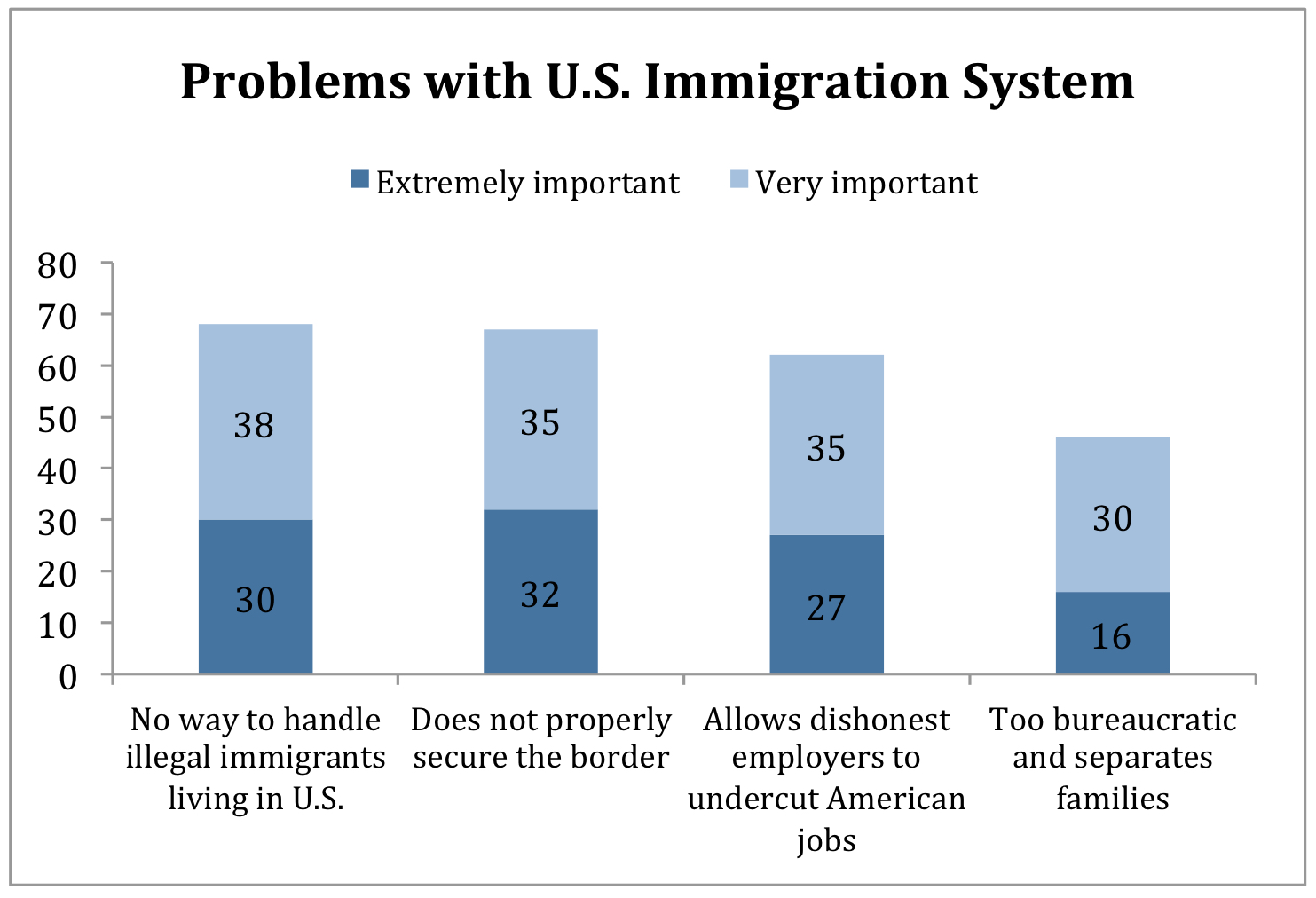Religion, Values, and Immigration Reform
Executive Summary
A new national survey by Public Religion Research Institute finds broad support across religious groups for a comprehensive approach to immigration reform and widespread support for clergy speaking out on the issue. It also shows broad agreement among Americans in different religious traditions about the set of values that should guide approaches to immigration reform.
The nationwide telephone survey of 1,201 Americans (n=1,047 voters), along with two state surveys of Ohio (n=402) and Arkansas (n=402) residents, was conducted March 5–11, 2010. The study was funded by the Ford Foundation.
Among the top findings:
Perceptions of the Immigration System
Nearly half (47%) of Americans say the issue of immigration is very or extremely important to them.
A majority (56%) of Americans say the immigration system is completely or mostly broken. Only 7% say the system is generally working, and about one-third (34%) say the system is working but with some major problems.
Six-in-ten Americans believe that it is somewhat (43%) or very difficult (17%) for immigrants to come to the U.S. legally today. White mainline Protestants and Catholics are significantly more likely than white evangelicals to say the legal immigration process is difficult (65% and 64% to 51% respectively).
More than two-thirds of the public say the inability of the immigration system to deal with illegal immigrants residing in the U.S. and the inability to properly secure the border are very serious or extremely serious problems (68% and 67% respectively).
More than 6-in-10 Americans (62%) also say it is a very or extremely serious problem that the immigration system allows dishonest employers to undercut American jobs by hiring illegal immigrants.
Values and Immigration Reform
Americans across the religious landscape largely agree on a clear set of values that should guide immigration reform policy.
At least 8-in-10 Americans rated four values as very or extremely important guides to immigration reform: enforcing the rule of law and promoting national security (88%), ensuring fairness to taxpayers (84%), protecting the dignity of every person (82%), and keeping families together (80%). There are few significant differences among religious groups; for example, white evangelical Protestants are just as likely as white Mainline Protestants, Catholics, and the unaffiliated say protecting the dignity of every person is a very or extremely important value.
A strong majority (71%) also say following the Golden Rule—“providing immigrants the same opportunity that I would want if my family were immigrating to the U.S.”—is a very or extremely important value.
There is a significant partisan values gap, particularly with regard to support for cultural-religious values and immigration policy.
There is general partisan agreement about pragmatic-legal values as guides to immigration reform. More than 8-in-10 Americans across the political spectrum rate the values of enforcing the rule of law/promoting national security and ensuring fairness to taxpayers as extremely or very important, with Republicans rating these slightly higher than Democrats.
However, by double-digit margins, Democrats are more likely than Republicans to rate cultural-religious values as important for immigration reform:
- For Democrats, the top two most important values that should guide immigration reform are protecting the dignity of every person and keeping families together. Democrats rate these values significantly higher than Republicans (88% vs. 74%, and 88% vs. 71% extremely/very important respectively).
- Democrats are also significantly more likely than Republicans to rate religious values such as following the Golden Rule and welcoming the stranger as very or extremely important for immigration reform (75% vs. 65%, and 60% vs. 45% respectively).
- Democrats are significantly more likely than Republicans to rate America’s cultural heritage as a nation of immigrants as very or extremely important for immigration reform (60% vs. 44%).
Comprehensive Immigration Reform vs. Alternatives
Americans across the religious and political spectrum support an earned path to citizenship, one of the key components of comprehensive immigration reform.
Nearly 9-in-10 (86%) Americans favor (6-in-10 strongly favor) a policy that includes one of the key provisions of comprehensive immigration reform—that illegal immigrants be required to register with the government, work, pay taxes, and learn English before having the opportunity to apply for citizenship.
Support remains strong across political party lines and all religious traditions. Religiously affiliated Americans are more likely to strongly favor reform than those who are unaffiliated.
When asked to choose between a description of comprehensive immigration reform and typical opposing arguments, Americans still prefer a comprehensive approach by a margin of approximately 2-to-1.
When choosing between a description of comprehensive reform and an argument that illegal immigrants should not be rewarded with amnesty or taxpayer-funded social services, 63% of the general public—including strong majorities of all major religious groups—choose comprehensive reform with an earned path to citizenship, compared to 31% who embrace the opposing position, a 32-point margin.
When the description of comprehensive reform includes language emphasizing that it reflects a commitment to the dignity of every person—by giving everyone “an opportunity to be responsible, contribute their fair share, and become full members of society”—fully two-thirds (66%) of Americans and all major religious groups choose that option, compared to 28% who embrace the opposing position, a 38-point margin.
Other findings on immigration policy:
More than 8-in-10 (84%) Americans agree that the American economy would benefit if illegal immigrants became tax-paying citizens.
More than three-quarters (76%) of Americans agree that, given the opportunity, illegal immigrants would work hard to earn a chance at citizenship.
A solid majority (56%) of the public oppose efforts to deport illegal immigrants back to their home countries.
Immigration Reform, Congregations, and Clergy
Americans who attend religious services regularly (at least once or twice per month) are generally comfortable with their clergy leaders talking about the issue of immigration in a variety of settings, although relatively few report hearing about the issue from religious leaders.
Roughly 1-in-4 (24%) Americans who attend religious services regularly report hearing their clergy leader speak about immigration at least occasionally.
A majority of regular religious service attenders say they would be very (25%) or somewhat (29%) comfortable with their clergy speaking about immigration from the pulpit, and 6-in-10 say they would be very or somewhat comfortable with clergy discussing the issue in their congregation’s newsletter or website.
Larger majorities of regular religious service attenders would be comfortable with clergy talking about the issue in an adult education session (74%), at a local community meeting (77%), or in the local media (75%).
I. Knowledge and Perceptions of the Immigration Process
Eight-in-ten Americans believe that immigration is at least somewhat important to them personally, although intensity varies significantly. About half (47%) of Americans say that it is very or extremely important to them.
There are significant partisan differences in attitudes about the importance of immigration, with Republicans about 1.5 times as likely as Democrats to say it is important. A majority (55%) of Republicans say that the issue of immigration is very or extremely important to them, compared to only 38% of Democrats.
Most Americans say they know at least something about the immigration process in the U.S., although only 1-in-4 say they know a lot. More than 1-in-4 (27%) Americans say they do not know much or know almost nothing about the immigration process. Religiously unaffiliated Americans are more likely to be familiar with the immigration process than Catholics or white evangelicals (30% to 21% respectively). White mainline Protestants report being about as familiar with the process as the general public.
Americans living in the West are somewhat more likely than those in other regions to report being familiar with the immigration process. Roughly one-third (31%) of Americans in the West say they are very familiar with the process, compared to 25% of Americans in the South, 23% in the East, and 21% in the Midwest.
Arkansans are somewhat more likely to say they do not know much about the immigration process. Nearly 4-in-10 (39%) say do not know much about the immigration process. Ohioans report being about as informed about the immigration process as the general public.
Six-in-ten Americans believe that it is very (17%) or somewhat (43%) difficult for immigrants to come to the U.S. legally today. Only about one-third say it is not too difficult (20%) or not at all difficult (14%).
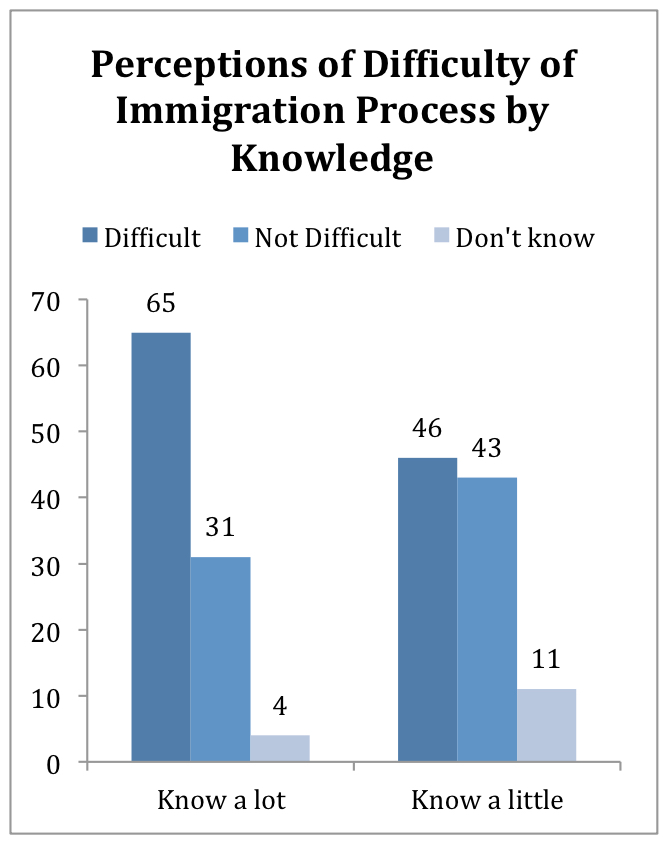 Americans who are more informed about the immigration process are more likely to believe that it is difficult to immigrate legally into the U.S. Among those who know at least something about the immigration process, roughly two-thirds (65%) say it is difficult. Among those who know little about the process, less than half (46%) say it is difficult. Younger Americans (age 18 to 34) and self-identified liberals are also more likely to say the legal immigration process is difficult (70% and 72% respectively). Among religious groups, white mainline Protestants and Catholics are significantly more likely than white evangelicals to say the legal immigration process is difficult (65% and 64% to 51% respectively).
Americans who are more informed about the immigration process are more likely to believe that it is difficult to immigrate legally into the U.S. Among those who know at least something about the immigration process, roughly two-thirds (65%) say it is difficult. Among those who know little about the process, less than half (46%) say it is difficult. Younger Americans (age 18 to 34) and self-identified liberals are also more likely to say the legal immigration process is difficult (70% and 72% respectively). Among religious groups, white mainline Protestants and Catholics are significantly more likely than white evangelicals to say the legal immigration process is difficult (65% and 64% to 51% respectively).
Approximately 4-in-10 (38%) Americans say immigrants today face a more difficult time coming to the U.S. legally than immigrants in previous generations. They are twice as likely to say the process has become harder than to say it has become easier (38% to 19%). Approximately 4-in-10 (38%) say that the immigration process is about as difficult today as it was in previous generations.
Nearly half of Democrats (45%) say the legal immigration process has gotten harder, compared to roughly one-third of Republicans (34%). Political independents look largely like the general public, with nearly 4-in-10 (38%) saying the process has gotten harder, and approximately the same number (40%) saying it has stayed the same. Finally, Americans who have grandparents who are immigrants are more likely to say that the process has become more difficult than those without immigrant family members (46% to 36% respectively).
Arkansans are less likely to say that it has become more difficult to come to the U.S. legally. About 1-in-4 (27%) say it has become more difficult compared to 35% of Ohioans and 38% of Americans overall.
II. Problems with the Immigration System
Very few Americans believe the current immigration system is working well. A majority (56%) say the immigration system is broken, with 21% saying the system is completely broken and 35% saying it is broken but working in some areas. Only 7% say the system is generally working, and about one-third (34%) say the system is working but with some major problems. A majority of Americans in every major religious group, including white evangelicals, white mainline Protestants, and Catholics, say the system is broken or completely broken.
Most of the public believe that there are a number of serious problems with the current immigration system. More than two-thirds say the inability of the immigration system to deal with illegal immigrants residing in the U.S. and the inability to properly secure the border are very serious or extremely serious problems (68% and 67% respectively). More than 6-in-10 (62%) also say it is a very or extremely serious problem that the immigration system allows dishonest employers to undercut American jobs by hiring illegal immigrants. Slightly less than half (46%) say that the bureaucratic nature of the system that leads families to be separated for years or decades is a very serious or extremely serious problem.
Liberals are significantly more likely than conservatives to say that the separation of family members is a very or extremely serious problem with the current immigration system (58% to 41% respectively). On the other hand, conservatives are much more concerned about border security, with three-quarters reporting that it is a very or extremely serious problem, compared to just half of liberals.
Americans who are immigrants or who have immigrant parents are twice as likely as those with no immigrant family ties to report that family separation is a serious problem. A solid majority of this group says the inability to keep families together is a very serious (29%) or extremely serious problem (27%).
Religious groups across the spectrum and residents of Arkansas and Ohio hold similar perceptions to the general public regarding problems with the immigration system.
III. Immigration Reform and Values
Americans want practical solutions to fix what they perceive to be a broken immigration system, but they also believe immigration reform should be guided by a number of key values. Four values are rated very or extremely important by at least 8- in-10 Americans: enforcing the rule of law and promoting national security (88%), ensuring fairness to taxpayers (84%), protecting the dignity of every person (82%), and keeping families together (80%). A strong majority (71%) also say following the Golden Rule—“providing immigrants the same opportunity that I would want if my family were immigrating to the U.S.”—is a very or extremely important value. Smaller majorities say continuing America’s heritage as a nation of immigrants or following the biblical example of welcoming the stranger are very or extremely important guides for immigration reform (54% and 53% respectively).
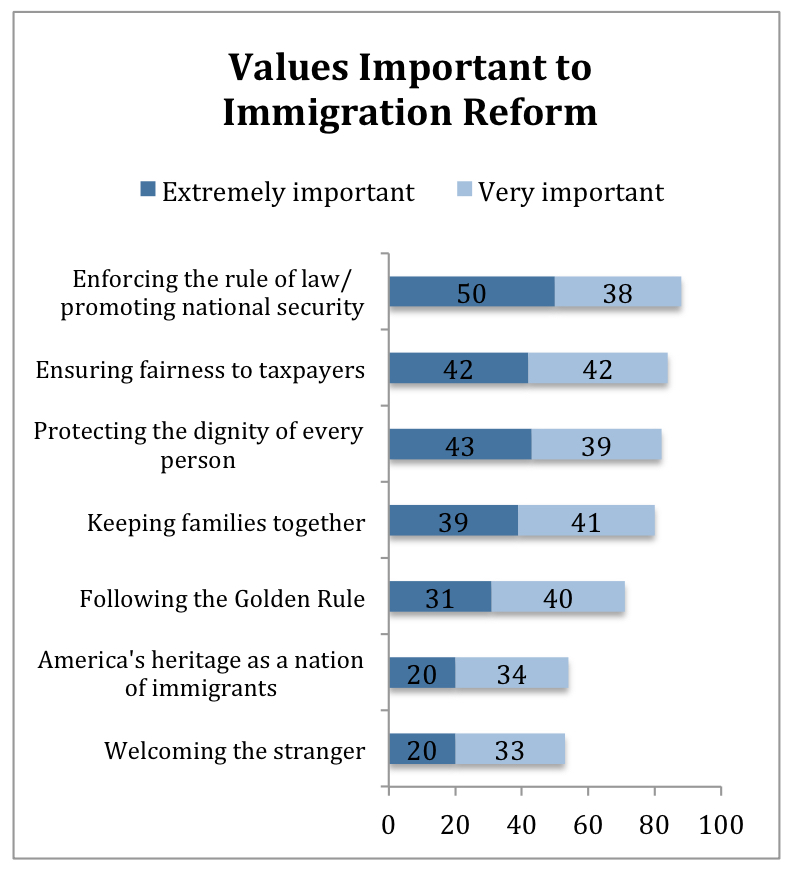 Religious groups across the spectrum largely agree on a set of values that should guide approaches to immigration reform; there are few significant differences between them. For instance, white evangelicals are just as likely as white Mainline Protestants, Catholics, and the unaffiliated to say protecting the dignity of every person or keeping families together is very or extremely important. White evangelicals are somewhat more likely to say that the biblical value of welcoming the stranger is an important moral guide than other religious groups (63% vs. 53% of the general public), although this value still ranks comparatively lower than most other values.
Religious groups across the spectrum largely agree on a set of values that should guide approaches to immigration reform; there are few significant differences between them. For instance, white evangelicals are just as likely as white Mainline Protestants, Catholics, and the unaffiliated to say protecting the dignity of every person or keeping families together is very or extremely important. White evangelicals are somewhat more likely to say that the biblical value of welcoming the stranger is an important moral guide than other religious groups (63% vs. 53% of the general public), although this value still ranks comparatively lower than most other values.
There is, however, a significant partisan values gap. When the values are separated into pragmatic-legal and cultural-religious values, significant differences appear between Republicans and Democrats. Among the pragmatic-legal values of enforcing the rule of law/promoting national security and ensuring fairness to taxpayers, there is closer partisan 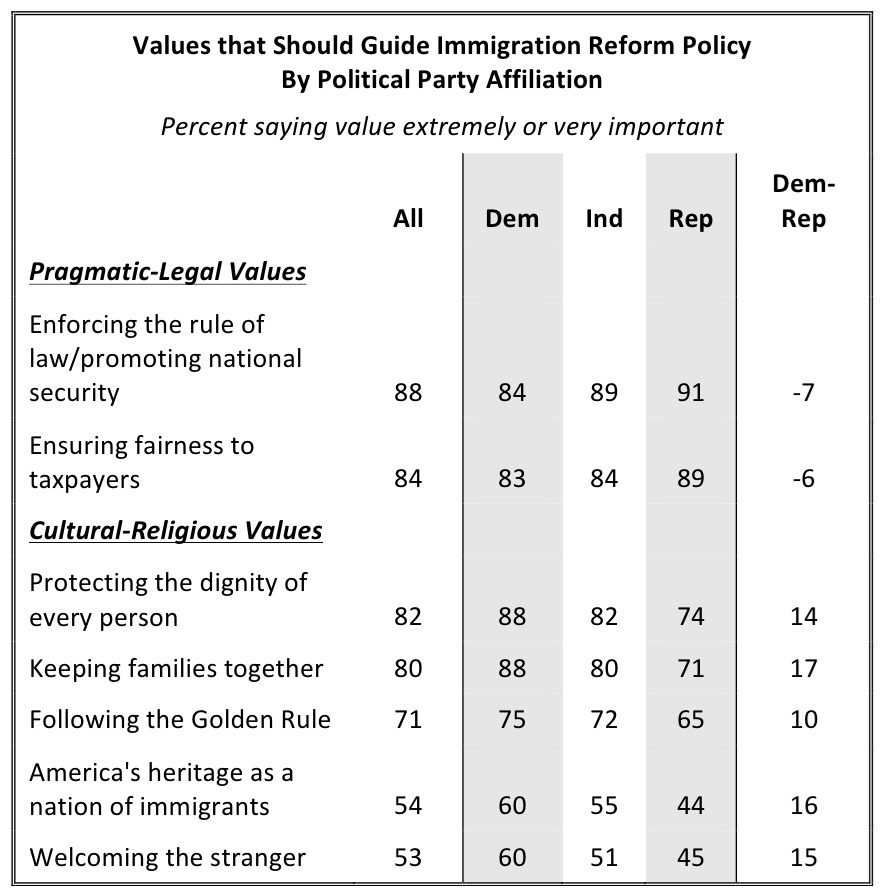 agreement. More than 8-in-10 Americans across the political spectrum rank these values as extremely or very important, with Republicans ranking these slightly more important than Democrats (7 and 6 points respectively).
agreement. More than 8-in-10 Americans across the political spectrum rank these values as extremely or very important, with Republicans ranking these slightly more important than Democrats (7 and 6 points respectively).
Democrats, however, rate all of the cultural-religious values higher than Republicans by double-digit margins. For Democrats, the top two most important values that should guide immigration reform are the values of protecting the human dignity of every person and keeping families together. Democrats rate these values 14 points and 17 points higher respectively than Republicans, and even slightly outrank the pragmatic- legal values among Democrats. Democrats also rate the values that are more directly tied to biblical principles, following the Golden Rule and welcoming the stranger, higher than Republicans (10 points and 15 points respectively). Finally, by a margin of 16 points, Democrats are significantly more likely than Republicans to rate America’s cultural heritage as a nation of immigrants as very or extremely important.
Ohio and Arkansas residents largely mirror the general public it terms of the values they say are important. However, Arkansans rate the importance of continuing America’s heritage as a nation of immigrants slightly higher than Americans overall (61% to 54% respectively).
Iv. Comprehensive Immigration Reform vs. Competing Arguments
The survey found strong support across the political and religious spectrum for a comprehensive approach to immigration reform. Americans overwhelmingly support an earned path to citizenship for illegal immigrants, one of the key provisions of comprehensive immigration reform. And when presented with several competing arguments, Americans strongly preferred a comprehensive approach to more limited approaches focused on enhanced security and enforcement by a margin of 2-to-1.
An Earned Path to Citizenship
Typically, one of the central elements of comprehensive immigration reform is the provision for an earned path to citizenship for illegal immigrants. When presented with the details of such a provision—that illegal immigrants would be required to register with the government, work, pay taxes, and learn English before having the opportunity to apply for citizenship—Americans overwhelmingly favor this approach. Nearly 9-in-10 (86%) Americans favor a policy that includes these requirements, and 6-in-10 strongly favor it.
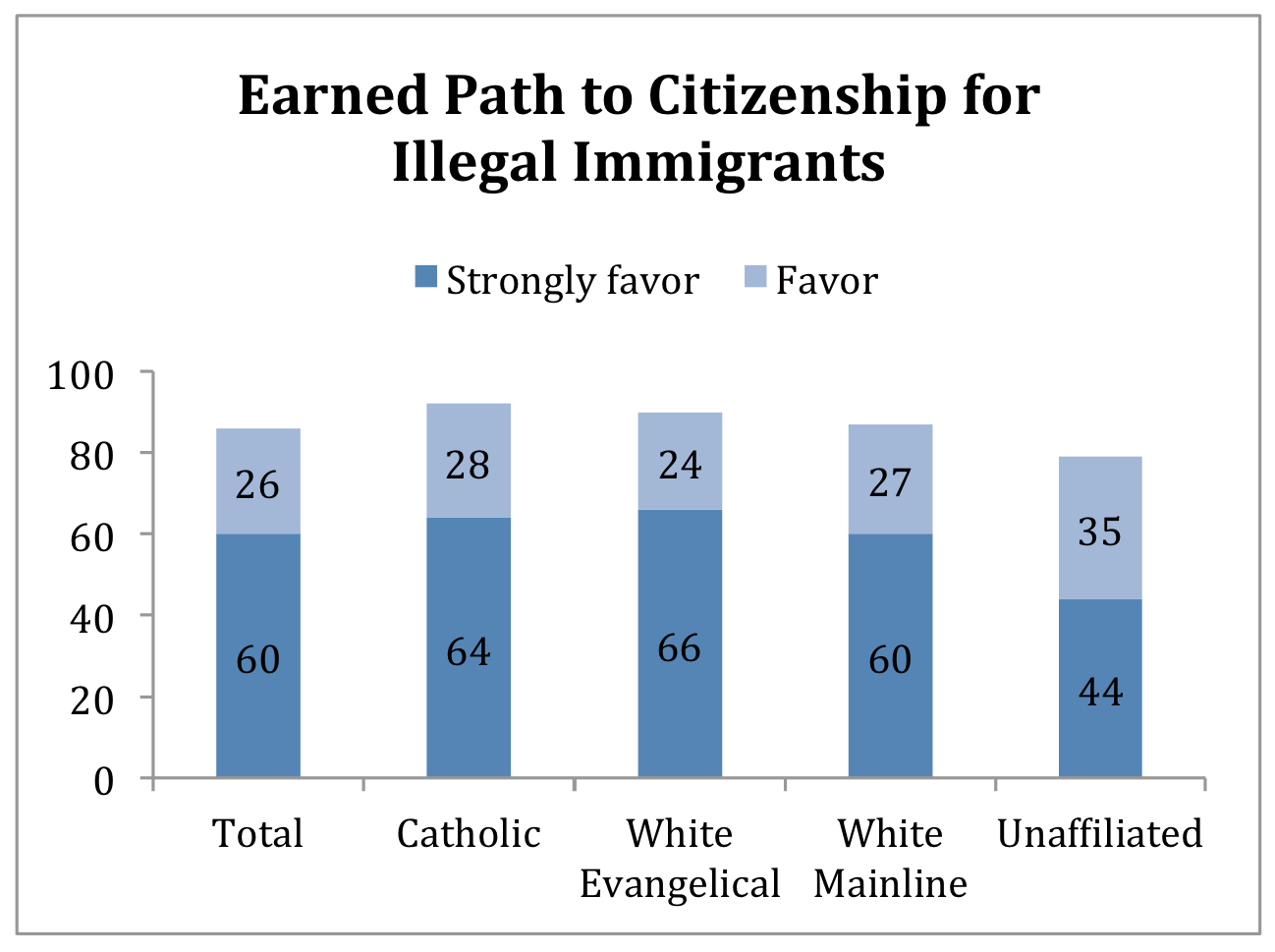 Support remains strong across all religious traditions. Americans affiliated with one of the major religious traditions are more strongly supportive of these reform elements than the unaffiliated. Ninety-two percent of Catholics favor this earned path to citizenship, with a majority (64%) strongly favoring it. Likewise, 9-in-10 white evangelicals also favor this earned path to citizenship, with fully two-thirds saying they strongly favor it. Among white mainline Protestants, nearly 9-in-10 (87%) favor these citizenship requirements overall, and 6-in- 10 say they strongly favor them. Among the unaffiliated, roughly 8-in-10 (79%) favor allowing an earned path to citizenship but just 44% say they strongly favor it.
Support remains strong across all religious traditions. Americans affiliated with one of the major religious traditions are more strongly supportive of these reform elements than the unaffiliated. Ninety-two percent of Catholics favor this earned path to citizenship, with a majority (64%) strongly favoring it. Likewise, 9-in-10 white evangelicals also favor this earned path to citizenship, with fully two-thirds saying they strongly favor it. Among white mainline Protestants, nearly 9-in-10 (87%) favor these citizenship requirements overall, and 6-in- 10 say they strongly favor them. Among the unaffiliated, roughly 8-in-10 (79%) favor allowing an earned path to citizenship but just 44% say they strongly favor it.
Support for this earned path to citizenship also finds overwhelming support across partisan and ideological lines, although there are significant differences in intensity. Eight-in-ten Democrats, 89% of Independents, and 91% of Republicans favor this approach. Republicans and Independents favor it more strongly (69% and 61% strongly favor respectively) than Democrats (only 49% favor strongly). Three-quarters of liberals, 91% of moderates, and 89% of conservatives also favor this approach with similar differences in intensity. Conservatives and moderates favor it more strongly (67% and 59% strongly favor respectively) than liberals (only 43% favor strongly).
Overall, there are no significant differences in support for an earned path to citizenship between the general public and residents of Ohio and Arkansas (86%, 85%, and 87% respectively). However, more than two-thirds (67%) of Arkansans strongly support an earned path to citizenship, compared to 55% of Ohioans.
Weighing Arguments For and Against Comprehensive Immigration Reform
When a description of comprehensive immigration reform is contrasted with typical opposing arguments, Americans still say they support a comprehensive approach by a margin of approximately 2-to-1.
When asked to choose between a description of comprehensive immigration reform—one that requires all illegal immigrants to register with the government, work, pay taxes, and learn English in order to have a opportunity to apply for citizenship—and an argument that illegal immigrants should not be rewarded with amnesty or taxpayer- funded social services, 63% of the public choose comprehensive reform with an earned path to citizenship, a 32-point advantage over those embracing the opposing position (31%). When the description of comprehensive reform includes language emphasizing that it reflects a commitment to the dignity of every person—by giving everyone “an opportunity to be responsible, contribute their fair share, and become full members of society”—fully two-thirds (66%) choose that option over the opposing position, a 38- point advantage over those embracing the opposing position (28%).
When the elements of comprehensive immigration reform were tested against a different opposing argument, one advocating the deportation of illegal immigrants to their home countries, nearly two-thirds (65%) say they prefer the immigration reform policy that allows an opportunity for citizenship. Only three-in-ten Americans support a position that entails denying social services to illegal immigrants and deporting them back to their home countries. When the description of comprehensive reform includes language emphasizing that it reflects a commitment to the Golden Rule—providing immigrants “the same opportunity I would want if my family were immigrating to the U.S.”—65% also say they prefer the comprehensive approach to an approach focused on deportation.
Americans are split over the timing of immigration reform. Forty-six percent agree that Congress can handle multiple issues simultaneously and that tackling immigration reform this year will help avoid more serious problems in the future. On the other hand, roughly an equal number (48%) agree that Congress should stay focused on jobs and health care this year and not attempt to pass immigration reform.1 When the description of tackling immigration reform this year includes language describing the problem of families being separated, the public remains split.
There are no significant differences by religious affiliation among these questions weighing arguments for and against comprehensive immigration reform. Like those in the general public, religious groups across the spectrum supported comprehensive approaches over opposing arguments by a roughly 2-to-1 margin, and were generally split on the timing of immigration reform.
Ohio residents do not differ from all Americans, but Arkansas residents hold distinctive views about the timing of immigration reform. A slim majority (52%) of Arkansans say Congress should not start work on immigration reform but instead should stay focused on jobs and health care. About 4-in-10 say that Congress should tackle immigration reform this year. When the argument for tackling immigration reform this year includes an appeal that reform would be the “right thing to do” because “our current system often separates families for years or even decades,” support for tackling reform this year jumps 14 points to 56%.
V. Views of Immigrants
A plurality (45%) of Americans believe that immigrants today strengthen our country because of their hard work and talents. Forty-three percent say immigrants are a burden because they take jobs, housing and health care. Views about the contributions of immigrants vary significantly among the public. Younger Americans age 18 to 34 are much more supportive than older Americans: 58% say that immigrants strengthen the country compared to only 36% of those age 65 or older. Liberals and Democrats also value the contributions of immigrants much more highly than conservatives and Republicans. A majority (55%) of Democrats and two-thirds of liberals say immigrants today strengthen the country, compared to one-third of Republicans and conservatives.
Catholics and white mainline Protestants largely mirror the population at large and are nearly evenly divided between those who say immigrants today strengthen the country and those who say they are a burden. White evangelicals are more likely to say immigrants today are a burden on the country (54%). Among the unaffiliated, nearly 6- in-10 (59%) say that immigrants today strengthen the country.
VI. Views of Illegal Immigrants
A majority (55%) of Americans say they have an unfavorable view of illegal immigrants, compared to 4-in-10 who say they have a favorable view. A majority of Democrats, the unaffiliated, and liberals say they have a favorable view of illegal immigrants (51%, 51%, and 56%, respectively). Forty-five percent of younger Americans age 18 to 34 also have a positive view of illegal immigrants. On the other hand, roughly one-third of conservatives (31%), Republicans (32%), and Americans age 65 or older (35%) have a favorable view of illegal immigrants.
Illegal Immigrants and Jobs
Americans are evenly split over whether illegal immigrants take jobs that American workers want. Half of the public disagree, compared to 48% who agree. Americans with lower educational attainment and income are more likely to believe that illegal immigrants take jobs Americans want. For example, nearly 6-in-10 (58%) Americans with a high school education or less and 54% of those making less than $30,000 a year say that illegal immigrants take jobs American workers want. In contrast, a majority of college educated, younger (age 18-34) and non-white Americans disagree that illegal immigrants take jobs wanted by American workers (57%, 54% and 60% respectively).
Majorities of Catholics, white mainline Protestants and the unaffiliated disagree that illegal immigrants take jobs Americans want (53%, 54% and 59% respectively). White evangelicals are the only group of religious Americans with a majority agreeing that illegal immigrants take jobs wanted by American workers (59%).
Both Arkansas and Ohio residents are more likely than all Americans to believe that illegal immigrants take jobs American workers want (58% and 56% respectively).
Economic Benefits of Turning Illegal Immigrants into Taxpayers
However, there is strong agreement that the American economy would benefit if current illegal immigrants became tax-paying citizens. Overall, more than 8-in-10 (84%) agree that making illegal immigrants tax-paying citizens would benefit the economy. That high level of support also crosses political and religious lines.
Residents of both Ohio and Arkansas also register overwhelming agreement with the idea that the economy would benefit if currently illegal immigrants became taxpaying citizens (83% and 79% respectively).
Illegal Immigrants and Earned Chance for Citizenship
Americans overwhelmingly agree that, given the opportunity, illegal immigrants would work hard to earn a chance at citizenship. More than three-quarters (76%) agree, and nearly 3-in-10 (29%) completely agree. There are few differences by religious affiliation, gender, age, or education. However, liberals are more than twice as likely to completely agree than conservatives (44% to 20% respectively).
Support and Opposition to Deportation
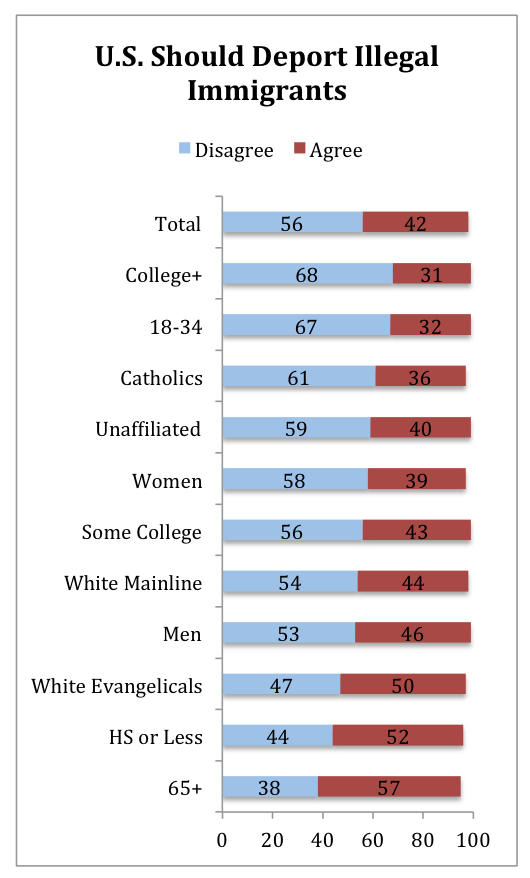 Although Americans are concerned about illegal immigrants currently living in the United States, a solid majority (56%) oppose efforts to deport illegal immigrants back to their home countries. Only about 4- in-10 agree that we should make a serious effort to send illegal immigrants back to their home countries.
Although Americans are concerned about illegal immigrants currently living in the United States, a solid majority (56%) oppose efforts to deport illegal immigrants back to their home countries. Only about 4- in-10 agree that we should make a serious effort to send illegal immigrants back to their home countries.
College-educated Americans, younger Americans and Catholics are most opposed to deportation. More than two-thirds of younger and college-educated Americans and more than 6-in-10 (61%) Catholics disagree that we should make serious efforts to deport illegal immigrants back to their home countries. A majority (54%) of white mainline Protestants also oppose deportation. On the other hand, half of white evangelicals and a majority of those with a high school education or less (52%) support making a serious effort to deport illegal immigrants. Older Americans age 65 and older are the most likely to agree (57%) that we should try to deport all illegal immigrants.
Ohio and Arkansas residents are not any more likely than all Americans to support the deportation of illegal immigrants.
“Illegal” versus “Undocumented” Immigrants
Although the terms are often used interchangeably to refer to immigrants who have come to the United States illegally, Americans view “illegal immigrants” slightly more positively than “undocumented immigrants.” A majority (55%) have an unfavorable view of illegal immigrants, but an even larger majority (62%) have an unfavorable view of undocumented immigrants.
Among college-educated Americans there is no difference in perceptions of the two groups. However, among those with a high school education or less, only 29% have a favorable view of undocumented immigrants, compared to 38% who have a favorable view of illegal immigrants. There are no significant differences among liberals and conservatives in their views of illegal versus undocumented immigrants. Among moderates, 43% have a favorable view of illegal immigrants compared to 34% who have a favorable view of undocumented immigrants.
The higher favorability of “illegal immigrants” vs. “undocumented immigrants” also persists among major religious groups, with the notable exception of white Mainline Protestants, among whom there is no significant difference.
VII. Immigration Reform, Churches, and Clergy
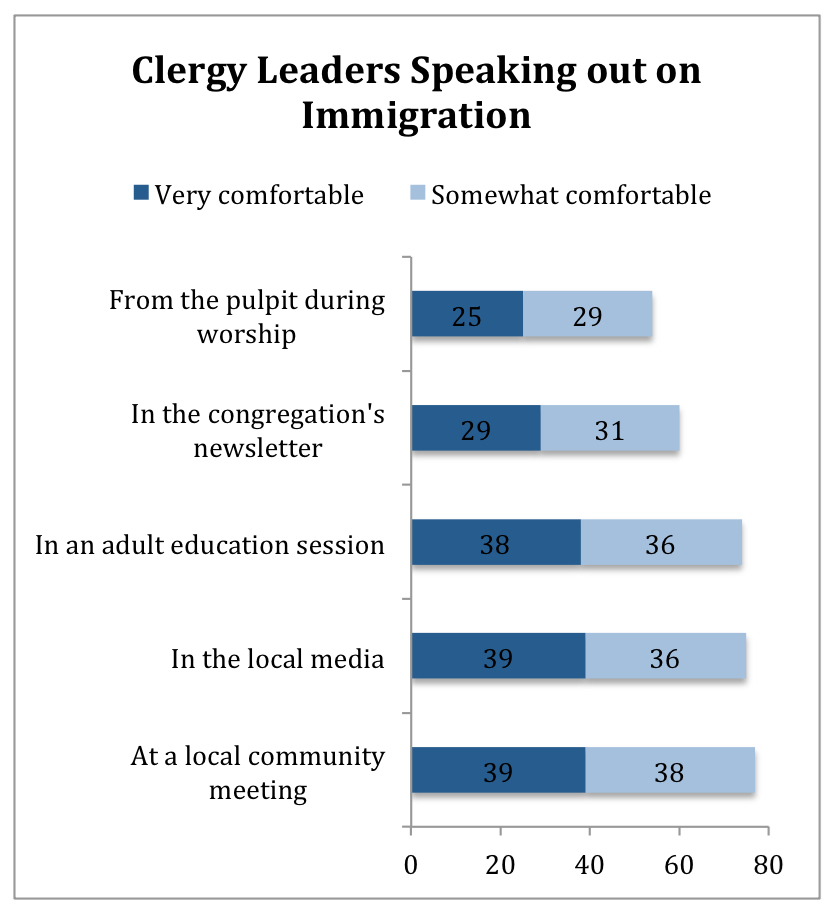 Roughly 1-in-4 (24%) Americans who attend religious services at least once or twice a month report hearing their clergy leader speak about the issue of immigration at least occasionally. Catholics who attend services regularly are most likely to hear about the issue in church. Nearly one-third (32%) of Catholics report hearing their priest speak about the issue of immigration sometimes or often. In contrast, only 16% of white evangelicals report hearing about the issue of immigration from their pastor. White mainline Protestants hear about the issue of immigration about as often as those who attend religious services regularly.
Roughly 1-in-4 (24%) Americans who attend religious services at least once or twice a month report hearing their clergy leader speak about the issue of immigration at least occasionally. Catholics who attend services regularly are most likely to hear about the issue in church. Nearly one-third (32%) of Catholics report hearing their priest speak about the issue of immigration sometimes or often. In contrast, only 16% of white evangelicals report hearing about the issue of immigration from their pastor. White mainline Protestants hear about the issue of immigration about as often as those who attend religious services regularly.
Religious Americans are comfortable with their clergy leader talking about the issue of immigration in a variety of settings. A majority of the religiously affiliated say they would be very (25%) or somewhat (29%) comfortable with their clergy speaking about the issue of immigration from the pulpit. Six-in-ten say they would be very or somewhat comfortable with their clergy discussing the issue in the congregation’s newsletter or website. Even larger majorities say they would be comfortable with their clergy talking about the issue in an adult education session (74%) or at a local community meeting (77%) or in the local media (75%).
Catholics are the most comfortable with their clergy talking about the issue of immigration from the pulpit during a worship service. More than 6-in-10 (61%) say they would be very or somewhat comfortable with this. A majority of white evangelicals also say they would be comfortable with their clergy addressing the issue from the pulpit. Among white mainline Protestants less than half (45%) say they would be comfortable with their clergy discussing immigration from the pulpit during a worship service.
Endnotes
1 Note that the survey was in the field prior to the passage of health care reform legislation on March 21, 2010.
Recommended citation:
Jones, Robert P., and Daniel Cox. “Religion, Values, and Immigration Reform: National Survey and State-level Surveys of Ohio and Arkansas.” PRRI. 2010. http://www.prri.org/research/religion-values-and-immigration-reform/.


